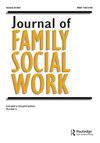父亲的基本作用:在移民和难民家庭中培养一种包容父亲的做法
IF 0.7
Q3 SOCIAL WORK
引用次数: 14
摘要
研究一致发现,当临床医生不积极鼓励父亲参与时,父亲继续被排除在主流临床社会工作实践之外,要么是因为缺乏如何让父亲参与的知识,要么是因为认为父亲参与的重要性存在偏见。对于移民和难民的父亲来说尤其如此。由于大多数研究集中在妇女和她们的孩子身上,男性难民和移民之间存在着巨大的差距。移民男性和父亲尤其容易被主流研究遗忘或排除在外。在难民研究中存在明显的性别偏见,对男孩、男性和父亲的关注较少。本文概述了父亲在儿童发展中的重要作用,移民父亲面临的障碍,他们在移民过程中的复原力,以及临床医生如何建立一个父亲包容的实践。本文将回顾(1)父亲在儿童发展中的重要作用,(2)移民父亲的人口统计,(3)父亲角色和家庭结构的转变,(4)移民父亲的社会压力源和障碍,(5)移民父亲的复原力,(6)父亲在临床实践中的障碍,(7)使用文化信息社会生态家庭系统模型的父亲包容性实践指南。本文章由计算机程序翻译,如有差异,请以英文原文为准。
The essential role of the father: fostering a father-inclusive practice approach with immigrant and refugee families
ABSTRACT Studies have consistently found that fathers continue to be excluded from mainstream clinical social work practice when clinicians do not actively encourage their participation either because of lack of knowledge of how to engage fathers or biases against considering father involvement important. This holds especially true of immigrant and refugee fathers. With the majority of research studies focused on women and their children, a tremendous gap exists for male refugees and immigrants. Immigrant males and fathers in particular tend to be either forgotten or excluded from mainstream research. A significant gender bias exists in refugee research with less attention paid to boys, men, and fathers. This article provides an overview of the essential role of fathers in child development, the barriers that immigrant fathers face, their resilience through the immigration process, and how clinicians can establish a father-inclusive practice. A review will be presented on (1) the essential role of fathers in child development, (2) demographics of immigrant fathers, (3) the shifting of paternal roles and family structures, (4) social stressors and barriers for immigrant fathers, (5) the resilience of immigrant fathers, (6) barriers for fathers in clinical practice, (7) guidelines for father-inclusive practice, using a culturally informed socioecological family systems model.
求助全文
通过发布文献求助,成功后即可免费获取论文全文。
去求助
来源期刊

Journal of Family Social Work
SOCIAL WORK-
CiteScore
2.10
自引率
0.00%
发文量
4
期刊介绍:
Each issue of the Journal of Family Social Work contains peer reviewed research articles, conceptual and practice articles, creative works, letters to the editor, and book reviews devoted to innovative family theory and practice subjects. In celebrating social workers" tradition of working with couples and families in their life context, the Journal of Family Social Work features articles which advance the capacity of practitioners to integrate research, theory building, and practice wisdom into their services to families. It is a journal of policy, clinical practice, and research directed to the needs of social workers working with couples and families.
 求助内容:
求助内容: 应助结果提醒方式:
应助结果提醒方式:


